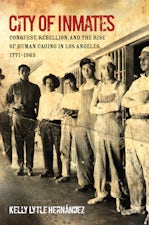Toxic Debt
An Environmental Justice History of Detroit
By Josiah Rector
344 pp., 6.125 x 9.25, 15 halftones, 2 tables
-
Paperback ISBN: 978-1-4696-6576-4
Published: April 2022 -
Hardcover ISBN: 978-1-4696-6575-7
Published: April 2022 -
E-book EPUB ISBN: 978-1-4696-6577-1
Published: February 2022 -
E-book PDF ISBN: 979-8-8908-5940-2
Published: February 2022
Justice, Power, and Politics
Buy this Book
- Paperback $39.95
- Hardcover $95.00
- E-Book $23.99
For Professors:
Free E-Exam Copies
Awards & distinctions
A 2023 Choice Outstanding Academic Title
Toxic Debt is not only a book about racism, capitalism, and the making of these environmental disasters. It is also a history of Detroit's environmental justice movement, which emerged from over a century of battles over public health in the city and involved radical auto workers, ecofeminists, and working-class women fighting for clean water. Linking the histories of urban political economy, the environment, and social movements, Toxic Debt lucidly narrates the story of debt, environmental disaster, and resistance in Detroit.
About the Author
Josiah Rector is assistant professor of history at the University of Houston.
For more information about Josiah Rector, visit
the
Author
Page.
Reviews
"[Josiah Rector] has written a book that advances two major interventions. First, it pushes back the environmental justice movement’s genesis to midcentury union organizing. Second, and just as significantly, it firmly connects the effects of debt and austerity—that is to say, capitalism—to environmental racism...Toxic Debt is an outstanding book...relentlessly clear-eyed in its focus on contemporary injustice and resistance."—Scott W. Stern, The New York Review of Books
"Every once in a while a book comes along that reorients the way in which we see the environment. Toxic Debt is one of those books . . . . an excellent book that sets the bar for a new way of looking at environmental justice."—Natural Resources & Environment
"A must-read for anyone doing work on the environment, sociology, public health, policy, or labor in Detroit and beyond . . . . accessible and important for wide-reaching audiences, including activists, policymakers, practitioners, and scholars."—Sociology of Race and Ethnicity
“An outstanding book examining multiple issues of environmental justice in Detroit. . . . Alongside the issues, Rector highlights the story of the many people involved in environmental justice activism, critically examining successes and failures in their efforts to bring about change. . . . Highly recommended.”—CHOICE
“Josiah Rector’s history of environmental justice in Detroit is breathtaking in its ambition and scope. Integrating environmental justice, urban history, and political economy, Rector lays out how environmental inequality came to be, as a confluence of white segregationists working with capitalists in industry, finance, and real estate at the expense of workers and communities. This dazzling debut is extensively researched, innovative, and a must-read for those interested in environmental justice, labor history, and contemporary problems that continue to land particularly hard on Black, Brown, and poor bodies and communities in Detroit and beyond.”—Julie Sze, author of Sustainability: Approaches to Environmental Justice and Social Power
“Toxic Debt is a vital record of a decades-long war against descendants of enslaved Africans who have fought to make the city of Detroit their home. Josiah Rector documents with disturbing clarity how those who fled to Detroit to escape southern racism became the targets of labor exploitation, environmental abuse, mass water shutoffs, and attacks on their democratic rights. Black Detroit has been marked for expulsion from the city because it is a community that has never been part of the corporate vision of a new kind of Detroit. What most distinguishes the book is its account of Black Detroit’s unrelenting, determined, and principled resistance.”—Mark P. Fancher, ACLU of Michigan Racial Justice Project Attorney




